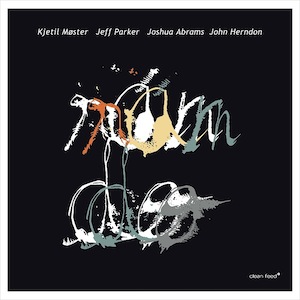Label: Self Produced, 2018
Personnel - Jeff Lederer: tenor sax; Jamie Saft: piano, harpsichord; Chris Lightcap: bass; Alison Miller: drums; Mary LaRose: vocals; Miles Griffith: vocals + Kirk Knuffke: cornet; Steven Bernstein: trumpet; Lisa Parrott: baritone sax; Joe Fiedler: trombone.
Proficient American saxist Jeff Lederer, a fundamental piece in Matt Wilson’s bands, energetically leads the Shakers N’ Bakers, a group that blends Christian rock music (usually inspired on the 18th-century religious sect Shakers), gospel, and impromptu jazz. The orchestrator relies on a classy ensemble comprised of some of the finest musicians on the scene, including keyboardist Jamie Saft, who doubles on harpsichord, bassist Chris Lightcap, drummer Alison Miller, and singers Mary LaRose and Miles Griffith (a new addition).
On their third album, Heart Love, the horn section was occasionally reinforced with cornetist Kirk Knuffke, trumpeter Steven Bernstein, trombonist Joe Fiedler, and baritonist Lisa Parrott, who give an extra punch to the reformulation of a few selected pieces from Music Is the Healing Force of the Universe (1969) and New Grass (1968) by the iconic saxophonist Albert Ayler and his live-in girlfriend Mary Maria Perks. The Shakers also threw in a couple of traditional songs plus “Goin’ Home”, a tune based on Antonin Dvorak’s Symphony No. 9’s Largo Movement. This American folk-inflected piece features Lightcap’s passionate bass solo during the theme’s statement. The bassist brings it again on the traditional “Nobody Knows the Trouble I've Seen”, having the delicate percussive enlightenment of the special guest Matt Wilson in the background. The drummer shines unreservedly on the African-American spiritual “Swing Low Sweet Chariot”, whose preliminary march, marked by soprano and drums, is dissolved into a hard-swinging flow with the addition of piano and bass. Besides the bandleader, a true force in the art of improvising, the heroes here are Saft, who excels in the way he makes the dissonant sound beautiful, and Wilson, a drummer who can make his instrument ‘sing’ the tunes.
A persuasive invitation to the spiritual world arrives with the gospel-drenched “Deep River”, a prayerful and melodious traditional song whose instrumentation exhorts the beauty of things, and on “Music Is the Healing Force of the Universe”, a modal blessing containing impactful horn unisons, LaRose's soulful voice, Griffith's scat singing, and Lederer's welcoming in/out digressions.
Settling on diversification, the band serves up a pair of elated R&B spectacles with “Everybody’s Movin” and the cut title, and also reggae interpretations of “Oh Love of Life” and “A Man is Like a Tree”, all of them authored by Ayler/Perks.
By taking a fluid and often combustible approach to the material at hand, Shakers N’ Bakers will make you rejoice with their spirited vision expressed with hope and humor.
Grade B+
Favorite Tracks:
04 - Deep River ► 05 - Music Is the Healing Force of the Universe ► 09 - Swing Low Sweet Chariot








































